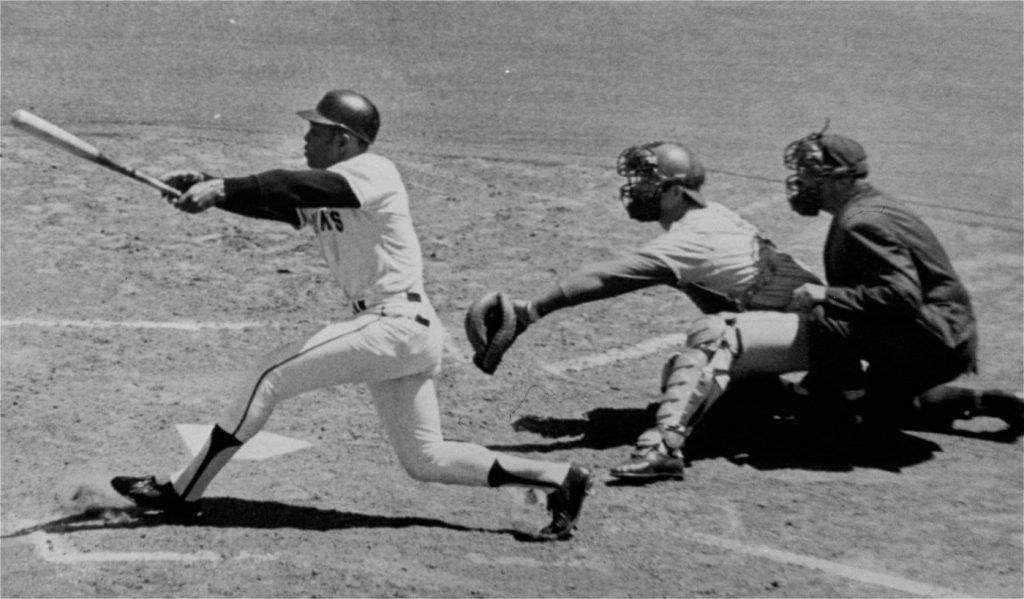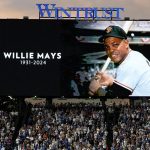I do not know conclusively if Willie Mays was the greatest baseball player of all time.
I do know that Mays, before his death Tuesday ay 93, never felt as insecure about that label as Joe DiMaggio did. After DiMaggio’s retirement from the playing field, whenever he made a personal appearance, his contract mandated that he be introduced as “the greatest living baseball player.” Mays never did anything like that. But with Mays, such a stipulation would have been superfluous. The entire world understood that Mays was the best. Just the best.
I do not know what Mays thought about DiMaggio — or what Mays thought about much else, really. Mays could be an unpredictable fellow. When asking him a question, you never quite knew what you’d get.
Sometimes, the answer would be direct. Sometimes, Mays would do a conversational jitterbug. It’s probably why he never became a manager or television voice. But he was always pure Willie Mays.
I do know that when Mays did speak unpredictably, he was always unpredictably sincere. I remember the day that McCovey Cove was dedicated outside Oracle Park — in honor of former Giants player Willie McCovey — and Mays was not scheduled to speak on the program. But literally at the last second, Mays decided to jump up and talk about his onetime teammate. He gave a disconnected, funny and touching speech that (I think) delineated his pride in just knowing McCovey as both a man and a Giant.
I do know that Mays was a baseball genius. The shame is that he played in an era when every game was not televised or filmed. I wish that more television highlights existed of the great plays he made. We have seen the clip of his 1954 World Series basket catch . . . what, maybe a million times? We’ve never been able to see so many other stunning holy-moly fantastic grabs and baserunning plays.
I do know that Mays was a prodigy and fierce competitor, right from the start. He supposedly learned to walk by chasing a baseball his dad rolled across the floor of the family home in rural Alabama. And back in the late 1940s, Mays was a high school junior when he was recruited by the Negro League team one state away in Chattanooga. One afternoon in Memphis, Mays was rounding third base and the opposing catcher blocked the plate. Mays went in high. He ripped the catcher’s pants from crotch to knees. Said the Chattanooga manager, Piper Davis: “After that, nobody tried to block the plate on Willie Mays.”
I do know that because of his rural Southern upbringing, Mays was an unlikely candidate to earn the love and respect of sports fans in Manhattan. But they couldn’t help loving him when they saw Mays in a Giants uniform, performing at a different speed and intensity than anyone else in the entire city, at a time when New York was home to three major league teams.
I do not know how history would have been different if the Giants had never relocated to San Francisco for the 1958 season. But I do believe Mays would have finished with more than 660 career home runs — because several dozen potential home runs were slammed back into the field of play by Candlestick Park’s ridiculous winds.
I do know one thing that people have forgotten about that day in 1965 when Giants pitcher Juan Marichal struck Los Angeles Dodgers catcher John Roseboro with a bat, sparking a vicious brawl. In that altercation, Mays held back Roseboro as emotions turned the contest into a cauldron of passion. And then Mays hit the winning home run. If that’s not the definition of a team leader, I don’t know what is.
I do know how Mays, as a human being, tried to help O.J. Simpson when Simpson was a troublemaking kid living in the San Francisco housing projects on Potrero Hill. Mays heard about the young kid with so much athletic promise and drove his luxury car there to pick up Simpson and spend the day with him, showing the kid how well a professional athlete could live if he fulfilled his potential and kept his nose clean. Simpson cited that day as a turning point in his childhood. If only the lessons had stuck with Simpson for his entire life.
I do not know if Mays was the best athlete in American sports history, in addition to being the best baseball player. But I do know what Jerry Krause, the former Chicago Bulls general manager, once said: “If Willie Mays had played only basketball from the time he was 8 years old, he’d have been Michael Jordan. And if Michael Jordan had played only baseball, he’d have been Willie Mays.”
I do know that even in Mays’ later years as his legs were betraying him, he could still summon enough speed to do damage. In 1966 on a bad wheel, he scored all the way from first base on a single to beat the Dodgers in a late September road game. Mays explained afterward: “We had a plane to catch and it was time to get it over with.”
I do not know how fair it was in 1979 when Bowie Kuhn, then baseball’s commissioner, suspended Mays from baseball after he accepted a job as “assistant to the president” of Bally’s Park Place casino in Atlantic City — essentially a glad-handing job, for just 10 days a month. I do know what singer Frank Sinatra said about the whole thing: “Mr. Kuhn told Willie Mays to get out of baseball. I would like to offer the same advice to Mr. Kuhn.”
Related Articles
SF Giants legend, MLB Hall of Famer Willie Mays dies at 93 years old
Athletics unload veterans Seth Brown, J.D. Davis in quest to snap skid
MLB denies SF Giants’ appeal for LaMonte Wade Jr. to participate in Rickwood Classic
Rickwood Field game: Willie Mays will forever be a Giant, but his roots are in Birmingham
Oakland A’s fans have a lot in common with Kansas City cousins when it comes to watching their team leave
I do know that when the Giants decided to build their new ballpark and erect a statue at 24 Willie Mays Plaza, everyone in the Bay Area had the same reaction at the same time: “Of course.”
I do know that over the last several years, as Mays struggled with his eyesight and other physical problems, it was difficult for him to spend as much time at 24 Willie Mays Plaza as he once did. And that has been melancholy to contemplate. But each time he did make it to the ballpark, no one received more respect or more applause. The statue is not going away. Neither are the stories.
I do not know how Mays will be remembered in 50 or 100 years. I do know that right here, right now, in the wake of his passing, there is only one way to remember him.
As the best.
— Mark Purdy was a Mercury News sports columnist from 1984-2017.


